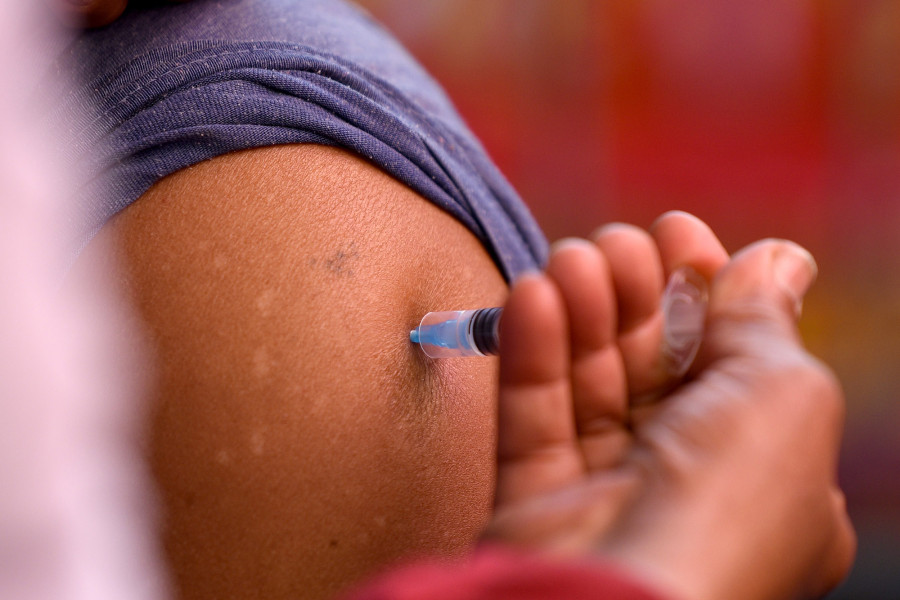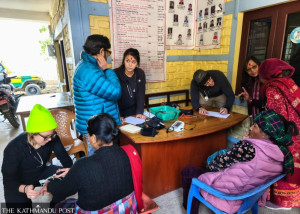Health
Zero Covid-19 deaths in 24 hours doesn’t mean risk subsided, experts say
For the first time in six months, Nepal reports zero deaths due to coronavirus infection as more frontline health workers continue to get vaccinated throughout the country.
Arjun Poudel
No one was reported to have died of Covid-19 in Nepal on Thursday, 179 days after the country had last reported zero Covid-19-related deaths on August 3, officials said.
Although the number of deaths due to infection came down to zero, it doesn’t mean that no one will die due to the disease from now on as more than 200 people are still testing positive every day.
“We should not forget that a lot of people are still in intensive care units and on ventilator support,” Dr Baburam Marasini, former director at the Epidemiology and Disease Control Division, told the Post. “Despite the decline in testing, over 200 people are testing positive every day. This shows that the risk of infection hasn’t declined.”
Nepal reported its first Covid-19 death on May 16 last year. The disease has so far claimed 2,020 people throughout the country. The Health Ministry said that 213 people tested positive for coronavirus throughout the country during the last 24 hours. As of Thursday, 270,588 people have been infected with the virus.
“Not only the infection numbers, but the number of deaths is also declining,” Dr Samir Kumar Adhikari, joint spokesperson for the Health Ministry, told the Post. “It is a happy coincidence that no one died due to the disease the very day we launched the immunisation campaign.”
Nepal launched out its Covid-19 vaccination drive on Wednesday, a little over a year after the country confirmed its first coronavirus case on January 24, 2020. At present, there are 3,203 active cases throughout the country.
Experts say that the major reason for the decline in the number of people testing positive for the virus is that the government has stopped providing free tests to asymptomatic people and the number of polymerase chain reaction tests conducted each day has declined significantly.
The government's decision to halt contact tracing completely has also hindered the identification of positive cases and their isolation. Infected people are seeking tests and treatment only when they fall seriously ill.
“Due to lack of active surveillance of the infection in the society, no one knows about the condition of the spread of the virus in the society,” Marasini added. “ It is high time we started active surveillance and increased the number of tests.”
Doctors say that even if the infection rates have declined, the figures can again go up and the virus can become more lethal if the country is hit by a second wave of infections.
“Experience from the other countries, where new cases declined similar to the way it has declined in Nepal, shows that infection rate can surge again,” Dr Sher Bahadur Pun, chief of Clinical Research Unit at the Sukraraj Tropical and Infectious Disease Hospital, told the Post. “We should not forget that risk has not declined and safety measures are still necessary.”
Adhikari, joint spokesperson at the Health Ministry, concedes that the risk of infection has not gone down and safety measures, including the use of face masks, maintaining social distance, and hand washing, are still necessary.
Meanwhile, the Ministry of Health and Population said that 17,669 people were vaccinated on Thursday. So far, 28732 have been vaccinated in the country.
The ministry said in a statement that 11, 461 people were administered the vaccine in Bagmati; 4,853 in Gandaki; 3,847 in Province 1; 2,417 in Sudurpaschim; 2,303 in Lumbini; 2,174 in Province 2 and 1,677 in Karnali.
“None of the people administered the vaccine suffered from major complications,” joint Adhikari informed.
The inoculation drive was launched after India provided one million doses of Covid-19 vaccine, developed by the University of Oxford and pharmaceutical giant AstraZeneca and locally manufactured by the Serum Institute of India, the world’s largest vaccine manufacturing company.
The India-manufactured vaccine, named Covishield, is Nepali authorities’ preferred choice, as the country’s existing storage facility supports the vaccine to maintain its cold chain. The Covidshield vaccine needs to be stored in temperatures between 2 to 8 degrees Celsius.
With the available doses, which have been already shipped to all seven provinces, the government plans to inoculate around 430,000 health care providers and frontline workers, including female community health volunteers, security personnel, elderly people taking refuge in old age homes, and prisoners.
The first phase of immunisation is taking place as per the Health Ministry’s plan to inoculate people in a staggered manner based on priority.
After frontline and healthcare workers, those above 55 years have been prioritised as Covid-19 death rates are the highest in this age group. Those between 40 and 55 years of age will be immunised in the third phase and the remaining will be inoculated in the fourth round only.




 20.12°C Kathmandu
20.12°C Kathmandu














